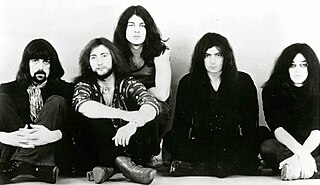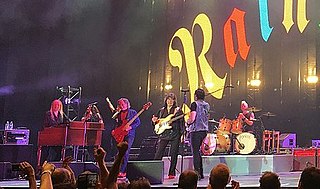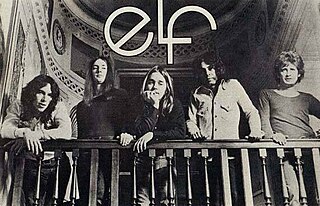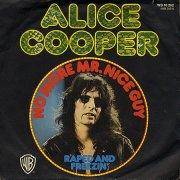
Deep Purple are an English rock band formed in London in 1968. They are considered to be among the pioneers of heavy metal and modern hard rock, although their musical style has varied throughout their career. Originally formed as a psychedelic rock and progressive rock band, they shifted to a heavier sound with their 1970 album Deep Purple in Rock. Deep Purple, together with Led Zeppelin and Black Sabbath, have been referred to as the "unholy trinity of British hard rock and heavy metal in the early to mid-seventies". They were listed in the 1975 Guinness Book of World Records as "the globe's loudest band" for a 1972 concert at London's Rainbow Theatre and have sold over 100 million albums worldwide.

Ronald James Padavona, known professionally as Ronnie James Dio, was an American heavy metal singer. He fronted and founded numerous bands throughout his career, including Elf, Rainbow, Black Sabbath, Dio and Heaven & Hell.

Rainbow are a British/American rock band formed in London and Los Angeles in 1975 by guitarist Ritchie Blackmore. Established in the aftermath of Blackmore's first departure from Deep Purple, they originally featured four members of the band Elf, including their singer Ronnie James Dio, but after their self-titled debut album, Blackmore fired these members, except Dio, recruiting drummer Cozy Powell, bassist Jimmy Bain and keyboardist Tony Carey. This line-up recorded the band's second album Rising (1976), while Long Live Rock 'n' Roll (1978) saw Bob Daisley and David Stone replace Bain and Carey, respectively. Long Live Rock 'n' Roll was also the last album with Dio before he left the band to join Black Sabbath in 1979.

Ritchie Blackmore's Rainbow is the debut studio album by American/British rock band Rainbow, released in 1975.

Long Live Rock 'n' Roll is the third studio album by the British heavy metal band Rainbow, released on 14 April 1978 and the last to feature original lead vocalist Ronnie James Dio.

Down to Earth is the fourth studio album by the British hard rock band Rainbow. It is their last album to feature drummer Cozy Powell, their first with bassist Roger Glover and keyboardist Don Airey and their only album with vocalist Graham Bonnet. Released in 1979, it contains Rainbow's first hit single "Since You Been Gone", marking a more commercial direction of the band's sound.

Elf was an American rock band founded in 1967 by singer and bassist Ronnie James Dio, keyboardist Doug Thaler, drummer Gary Driscoll, and guitarists Nick Pantas and David Feinstein. The band was originally called the Electric Elves, but was shortened to the Elves in 1968 and finally Elf in 1972. Elf disbanded in 1975 after recording three albums and after most of the lineup had been absorbed into the newly formed Ritchie Blackmore's Rainbow.

Rock Swings is an album by Paul Anka. Recorded in November 2004 and released on May 31, 2005 in Canada and June 7, 2005 in the United States, it contains swing jazz covers of popular rock and pop songs from the 1980s and 1990s.

Richard Hugh Blackmore is an English guitarist and songwriter. He was a founding member and the lead guitarist of Deep Purple, playing jam-style hard rock music that mixed guitar riffs and organ sounds. He is prolific in creating guitar riffs and has been known for playing both classically influenced and blues-based solos.

The Very Best of Rainbow is a greatest hits compilation album by the British hard rock band Rainbow. It was released in 1997 and features material ranging from 1975's Ritchie Blackmore's Rainbow to 1983's Bent Out of Shape.
Andrew Simpkins was an American jazz bassist.

Craig M. Gruber was an American rock bassist, best known as the original bassist in Rainbow. He also played in Elf, consisting of vocalist Ronnie James Dio, keyboardist Mickey Lee Soule, drummer Gary Driscoll and guitarist David Feinstein.

"No More Mr. Nice Guy" is a song by American rock band Alice Cooper, released in 1973 as a single off their sixth studio album Billion Dollar Babies (1973). The single reached No. 25 on the US charts and No. 10 on the UK charts, and helped Billion Dollar Babies to reach No. 1 in both the UK and the US. The song was written by Michael Bruce and Alice Cooper.

This is a list of Ronnie James Dio releases. Some of his early appearances on 45 rpm singles are collected on several volumes of the LP series The History of Syracuse Music, released in the 1980s. A complete discography with lyrics can be found here.

During his career as a singer and composer, Pat Boone released 63 singles in the United States, mostly during the 1950s and early 1960s when Boone was a successful pop singer and, for a time, the second-biggest charting artist behind Elvis Presley according to Billboard. Boone has had over 25 singles reach the top 20 on the U.S. singles charts, including the number-one hits "Ain't That a Shame" (1955), "I Almost Lost My Mind" (1956), "Don't Forbid Me" (1957), "Love Letters in the Sand" (1957), "April Love" (1957), and "Moody River" (1961). "I'll Be Home" (1956) reached No. 1 in the UK. He set a Billboard record, which he still holds, for spending 220 consecutive weeks on the charts with one or more songs each week.
"Mistreated" is a song by the English rock band Deep Purple taken from their 1974 album Burn. The song was written by the band's guitarist Ritchie Blackmore and new vocalist David Coverdale, who, along with new bassist Glenn Hughes, brought new blues and funk elements to the band.
"Stargazer" is a song by the British-American rock supergroup Rainbow, released as fifth track from the band's second studio album Rising (1976). It is an epic song narrating the story of a powerful wizard whose attempt to fly by constructing a mystical tower to the stars leads to the enslavement of vast numbers of people. "Stargazer" is notable for its musical complexity, with the guitar, lyrics, and drum intro cited as significant examples of the talents of guitarist Ritchie Blackmore, singer Ronnie James Dio, and drummer Cozy Powell.

Rising is the second studio album by the British-American rock band Rainbow. It was released on 17 May 1976.

"Man on the Silver Mountain" is a song by English-American rock band Rainbow, released as the first track of their 1975 debut studio album, Ritchie Blackmore's Rainbow. Written by Ritchie Blackmore and Ronnie James Dio, it was their debut single.
















